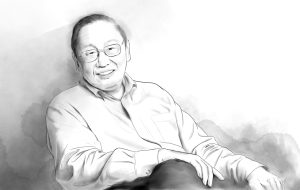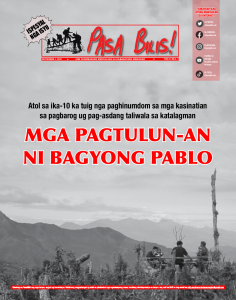by Nova Viejo Nong Daniel, the communal farm and the people’s militia

It’s nothing unusual for the residents here to notice suspicious people lurking around their community. For sure, there’s a full military operation. Nong Daniel knows that this is surely connected to large-scale mining. This has been the government’s plan for quite some time. Even before Typhoon Pablo, mining surveyors had already come. The residents had also received letters from the 76th IB ordering them to go to the headquarters to surrender and sign some documents. But, they didn’t go. They have done nothing wrong; they weren’t criminals.
Despite the update, more than 60 residents continued clearing their newly-established communal farm. This is a three-hectare rice communal farm. They need to produce food after the storm destroyed their crops. The KRB and the mass organizations agreed to revive and increase the harvest of this communal farm.
“Have some breakfast first!” says Kas Karding, who came with the other militia, bringing food with them. They had been assigned to cook for those participating in the communal. Nong Daniel approaches the militia.
“Kas, what’s the update about that suspicious person in our community?” asks Nong Daniel.
“We saw boot prints just now. The fascists will come anytime now,” Kas Karding responds.
“They’re more careful now. The thugs! One time, their asset was captured.” Nong Daniel passes the vegetable stew to those in the communal.
“Exactly 60 attended? Is there anyone absent?” Kas Karding grins. “Surely, our yield this harvest will be big,” he adds.
“Yes, assessments after the day’s work really helped,” Nong Daniel explains.
“We in the people’s militia became closer since the typhoon. Due to the communal, I can say that we are more organized now. We are stronger in facing challenges,” Kas Karding says. He turns his gaze toward the far end of the communal farm. The rice glistened like gold in the daylight.
Nong Daniel is the chairman of the sub-committee for Economy of the Barrio Revolutionary Committee, the people’s government established in the guerilla bases.
“This month, we can harvest the sweet potatoes we planted. The children will have their share. The elderly and the sick will also have theirs,” announces Kas Karding.
“Okay, let’s go. We still have to do reconnaissance over that end. Our task calls,” says Kas Karding, placing his .38 calibre pistol on a holster by his side.
“Take care. Thank you for the meal!” exclaim the people in the communal farm as Kas Karding and the militiamen head towards their own destination.
Nong Daniel and the others continue clearing the communal. In no time, the three-hectare area is cleared. Everyone is in high spirits. Nong Daniel is certain he and the others are thinking of the same thing—to be able to eat the fragrant and sweet rice soon. Because of Typhoon Pablo and the hardships that they experienced after, they had come up with the best way to recover: through genuine cooperation.
Pak! Pak! Pak! Praaaaak!
“Everyone on the ground!” shouts Nong Daniel to the others.
Pak! Pak! Pak!
“Who’s your leader here?” barks a soldier from somewhere. Nong Daniel thinks that it might be the military commander. “You’re quite many. You’re NPAs, right? Where are your weapons?”
“Sir, we are indigenous peasants here in our community. We’re around 60 here,” says Nong Daniel, his face on the ground.
“You’re joking!” The soldier kicks Nong Daniel’s leg. “You’re good at answering back, huh!”
Soldiers aim their weapons at the people on the ground. Nong Daniel sees their patches, 76th IB, but no names.
“Last time, our companion went missing around here. You were responsible for that, right?” the soldier asks with scorn.
The residents all have their faces on the ground.
“Sir, there are only bolos here. There are no weapons,” reports a soldier to their superior who continues interrogating the masses.
“Okay, gather all the bolos. You already know what to do,” commands the superior as he collars Nong Daniel to stand. “Everybody on your feet! Follow us!”
Nong Daniel is shoved at the front of the line. He feels the barrel of the armalite on his side.
Minutes later, Nong Daniel and the masses look in horror as the soldiers burn all their farming tools. Oh, what a waste! It was difficult getting those from the town and the tools were also donated by those who supported them after the typhoon. And they just burned them all! The scoundrels!
“Get to your village square!” barks a soldier, pushing Nong Daniel.
At the village square, children, mothers, and the elderly are herded out of their homes. Others are shaking in horror. The people are frightened. Small children are crying.
“Sir, good morning. What’s this?” asks the worried barrio captain.
“Are these people really residents of this barrio?” asks a soldier in return.
“Sir, they are the officers and members of the peasant association here. Why did you drag them here? It’s their schedule to farm today so that they can have some food after the disaster brought by the typhoon,” the barrio captain says.
“We’re just making sure that they’re residents here and to ensure our security. We lost a soldier here in your barrio,” says the soldier.
“It’s better that you keep your distance, sir. It’s not safe for the civilians. And there are many children…” says a barrio councilor.
“We won’t do anything. Just continue your work, we’ll also continue ours. We’re just following orders from our higher ups,” the soldier insists. “But if we had been the NPA, you’d probably let us stay on for months,” the soldier adds ruefully.
The soldiers enter the barangay hall and nearby houses. One soldier signals to Nong Daniel. “You! Bring us water, a cooking pot, and a chicken!” the soldier says. “And be warned: if something bad happens to us, we will massacre you all! Clear?” threatens the soldier.
Nong Daniel overhears some soldiers interrogating another farmer. “What’s the purpose of your farm? Why is it so wide? Is it for the NPA?” accuses the soldier.
“After the typhoon, the farmers of this community united so that we can recover. We immediately farmed our plots in order to feed our families. Food is the primary problem of the people here. That’s why a wide communal farm is our solution,” the farmer articulates.
“Food for the communists!” shouts the soldier. The farmer does not reply. They restrain themselves.
“How true is it that the NPA stayed here in your community during the typhoon?” another accusation from some other soldier.
“They’re everywhere in the countryside, sir. But, they don’t stay long. They just pass by. They go to the mountains. You’ll find them there,” says another farmer standing beside Nong Daniel.
“That’s why we’re staying here within your midst so the NPA won’t dare attack us,” says the soldier.
“But that’s a violation of the CARHRIHL*, sir! You’re turning us into human shields. You’ll be held accountable. Military soldiers aren’t allowed to stay in communities,” cries a young woman who’s a member of the association. She couldn’t help herself.
“We don’t care about that CARHRIHL. Just file cases against us,” the soldier replies.
“Nong, is everyone ready for the plan?” one farmer turns to Nong Daniel. Nong Daniel nods in determination.
The masses see that the soldiers are still laughing. The thugs write rude graffiti on the barangay hall’s walls. They put up their hammocks after they had eaten.
The residents in the community already know what to do in this scenario. A mother grows nervous, and develops loose bowels. The community medics massage and do acupuncture on her.
“We’re still safe so far. We’re having chicken here. Hurry up so we can start stage two of our program. Over.”
“Roger. Wait for us. Big fallen trees are blocking our path,” the voice from a soldier’s vhf radio.
The soldiers sleep soundly in the barangay hall. They are exhausted. They haven’t slept for five days.
At dawn, the residents come out of their houses one by one. Nong Daniel is at the head of the procession, followed by the children and the elderly. Carefully, they trail towards town. They figure they’ll arrive at the town center by 6:00 in the morning. They will air their community’s situation to the public. The way is dark and gloomy. But, it would be darker and gloomier if they stay in their community garrisoned by soldiers.
Pak! Pak! Pak! Boom! Boom!
Nong Daniel and the masses hear the gunshots from afar. It’s them! It’s them! Nong Daniel smiles to himself. Their steps suddenly have more energy. Kas Karding, Nong Daniel’s brother and one of the people’s militia, has surely made the fascists jump out of their hammocks, scrambling to escape the volley of gunfire.
*CARHRIHL – Comprehensive Agreement on the Respect for Human Rights and International Humanitarian Law
____
First published in Pasa Bilis! April 2015 issue.
(Pasa Bilis! Special Issue, December 4, 2022)



